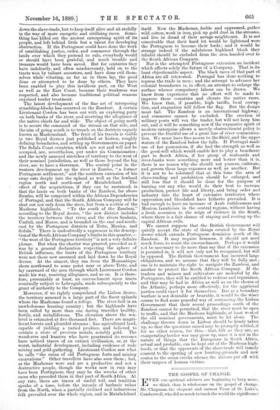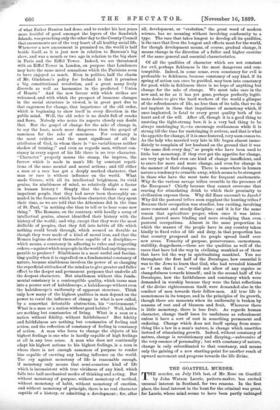THE GOSPEL OF CHANGE. E VEN our spiritual advisers are beginning
to harp more, we think, than is wholesome on the gospel of change. Mr. Chapman, the eloquent and earnest Vicar of St. Luke's, Camberwell, who did so much to teach the world the significance of what Father Damien had done, and to render his last years more fruitful of good amongst the lepers of the Sandwich Islands, was preaching only the other day to the County Council that amusements are of the very heart of all healthy social life. Whenever a new amusement is promised us, the world is half beside itself, as it is just now in relation to Barnum's big show, and was a month or two ago in relation to the big show in Paris and the Eiffel Tower. Indeed, we are threatened with an Eiffel Tower in London, on purpose that Londoners may have the same novel sensations which the Parisians seem to have enjoyed so much. Even in politics, half the charm of Mr. Gladstone's policy for Ireland is that it promises a big constitutional revolution, and a great many lively discords as well as harmonies in the predicted "Union of Hearts." And the new favour with which strikes are welcomed, and with which the prospect of immense changes in the social structure is viewed, is in great part due to that eagerness for change, that impatience of the old order, which is beginning to show itself in every direction in the public mind. Well, the old order is no doubt full of cracks and flaws. Nobody who notes its aspects closely can doubt that. But the gospel of change for the sake of change is, to say the least, much more dangerous than the gospel of sameness for the sake of sameness. For constancy is the most evident and the most significant of all the attributes of God, in whom there is "no variableness neither shadow of turning ;" and even as regards man, without con- stancy in every aspect of his life there is no true character. " Character " properly means the stamp, the impress, the furrow which is made in man's life by constant repeti- tions of the same mental and moral actions ; and till either a man or a race has got a deeply marked character, that man or race is without influence on the world. What made Greece, with all its intellectual brightness, its vivid genius, its nimbleness of mind, no relatively slight a factor in human history ? Simply that the Greeks were an impatient people, that they had never been thoroughly an- nealed in the furnace which hardens character, that they spent their time, as we are told that the Athenians did in the time of St. Paul, "in nothing else than to tell or to hear some new thing." The Romans, on the contrary, with hardly a scrap of intellectual genius, almost identified their history with the history of the world; and why, except that they were the most drillable of peoples, that they fell into habits of life which nothing could break through, which seemed as durable as though they were made of a kind of moral iron, and that the Roman legions showed themselves capable of a discipline,— which means, a constancy in adhering to rules and respecting orders,—against which no people in the world had anything com- parable to produce ? Nimbleness is a most useful and fascina- ting quality when it is engrafted on a fundamental constancy of nature, because nimbleness involves the power of so changing the superficial attitudes of the mind as to give greater and fuller effect to the deeper and permanent purposes that underlie all the deepest characters. But nimbleness without this funda- mental constancy is a contemptible quality, which turns man into a poorer sort of kaleidoscope, a kaleidoscope without even the kaleidoscope's uniformity of apparent structure. Think only how many of the highest qualities in man depend on the power to resist the influence of change in what is now called, by a somewhat detestable abstraction, his "environment." What is a man or a nation without good habits ? Well, habits are nothing but constancies of living. What is a man or a nation without fidelity, without faithfulness ? But fidelity and faithfulness are nothing but constancies of feeling and action, and the reflection of constancy of feeling in constancy of action. A man who loves to change the objects of his highest feelings is one who is hardly capable of high feelings at all in any true sense. A man who does not continually adapt his highest actions to his highest feelings, is a man in whom there is not enough sameness of purpose to render him capable of exerting any lasting influence on the world. The cry against monotony of life is reasonable enough, if monotony only means that semi-comatose kind of life which is inconsistent with true vividness of any kind, which falls into half-mechanical modes of thinking and acting. But without monotony of purpose, without monotony of method, without monotony of habit, without monotony of emotion, and without monotony of principle, there is no real character capable of a history, or admitting a development ; for, after
all, development, or "evolution," the great word of modern science, has no meaning without involving conformity to a type. The race that takes longest to develop all its qualities, is the race that lives the longest and effects most for the world, for though development means, of course, gradual change, it means change in the direction of a fuller and higher exercise of the same general and essential characteristics.
Of all the qualities of character which are not constant for evil, perhaps fickleness is the most dangerous and con- temptible. Indeed, in some sense, even constancy for evil is preferable to fickleness, because constancy of any kind, if its spring of action can once be purified, may turn into constancy for good, while in fickleness there is no hope of anything but change for the sake of change. We must take care in the new and, so far as it has yet gone, perhaps perfectly legiti- mate desire to give the hard workers of the world a glimpse of the refreshments of life, no less than of its toile, that we do not implant in them that impatience of monotony which, if once implanted, is fatal to every great quality both of the heart and of the will. After all, though it is a good thing to unstring the tight-strung bow, it is a very bad thing to be always unstringing it,—to encourage restlessness while it is strung till the time for unstringing it arrives; and that is what the appetite for change, if it is once fostered, very soon comes to. As the lady who married very late in life began almost imme- diately to complain of her husband on the ground that it was "the same dish every day," so people who have been used to little but monotony, if they ever get the appetite for change, are very apt to find even one kind of change insufficient, and to crave for more and more change, and even for change in the manner of their changes. There is somewhere in human nature a tendency to crumble away, which seems to be strongest in those who have the most taste for frequent excitements. Why do the various savage tribes crumble in the presence of the European? Chiefly because they cannot overcome that craving for stimulating drink to which their proximity to civilisation exposes them. Why did Esau succumb to Jacob ? Why did the pastoral tribes soon supplant the hunting tribes ? Because their occupation was steadier, less exciting, involving more constant and steady discipline ; and it is for the same reason that agriculture proper, when once it was intro- duced, proved more binding and more steadying than even pastoral occupations. Almost in the same proportion in which the masses of the people have in any country taken kindly to fixed rules of life and duty, in that proportion has that country prospered and its people spread itself over new areas. Tenacity of purpose, perseverance, earnestness, stability, doggedness,—these are the qualities as well of the races that have led the way in civilising mankind as of those that have led the way in sphitualising mankind. You see throughout the first half of the Decalogue, how essential it was to the Jews to learn that God, who had revealed himself as "I am that I am," would not allow of any caprice or changefulness towards himself; and in the second half of the Decalogue, how the faithfulness and constancy which were demanded in worship because they were the faint reflections of the divine righteousness itself, were demanded also in the conduct of men towards their fellow-men. All true life is monotonous in its temper, and in the principles of its growth, though there are moments when its uniformity is broken by seasons of rest and of blossom and fruit. Wherever there is little monotony, there is less fruit. As regards human character, change itself loses its usefulness as refreshment unless it have a sort of root in something permanent and enduring. Change which does not itself spring from some- thing like a law in a man's nature, is change which unsettles instead of stimulating growth. Indeed, without constancy of nature, change is revolutionary and dizzying,—subversive of the very essence of personality ; but with constancy of nature, change is only subordinated to that constancy, and means only the gaining of a new starting-point for another reach of upward movement and progress towards the life divine.



















































 Previous page
Previous page